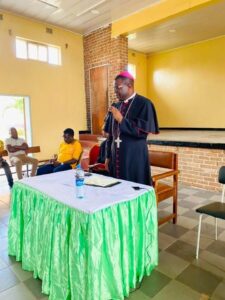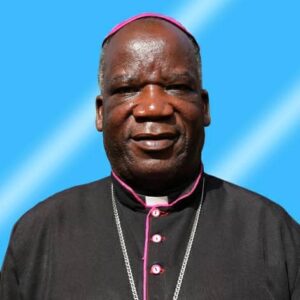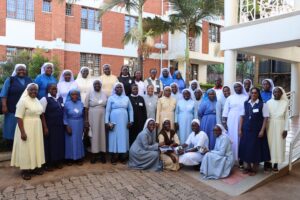ETHIOPIA: Stay fully committed to the promotion of human rights, justice and peace, says Bishop Rugambwa

Most Rev. Protas Rugambwa, Secretary of the Congregation for the Evangelization of people delivering Key Note Address at AMECEA 19th Plenary Assembly
The Secretary of the Congregation for the Evangelization of Peoples, Most Rev. Protase Rugambwa has encouraged AMECEA Bishops to ensure that they promote a spirit of communion and harmony among themselves and within the institutions of their local Churches to build a new Africa which depends on Africans themselves.
Delivering his speech on 15th, July, 2018 during the study session of the 19th AMECEA plenary assembly in Addis Ababa, Ethiopia, Bishop Rugambwa encouraged his brother bishops to remain anchored in the essential mission of the Church while addressing challenges facing local Churches in the AMECEA region.
Reflecting on the theme of the plenary, ‘Vibrant Diversity, Equal Dignity, Peaceful Unity in God in the AMECEA Region’, he said, “in this case you need to address the challenges arising from conflicts, divisions, violence, violations of human dignity and look for relevant solutions by undoubtedly, an integral part of the Church’s evangelizing ministry.”
He emphasized on the need for unity among AMECEA member countries despite ethnical diversity which like other parts of Africa, is characterized by multiple differences among its inhabitants: differences in culture and customs, language, ethnic and tribal affiliation, liturgical rites and socio-political orientation among others.
The prelate advised bishops not to entertain ethnic conflicts saying that, they have divided not only societies but also religious institutes, Episcopal Conferences and many others causing a lot of suffering and even public scandal in some parts of the continent.
“This is why the Church in Africa feels, more than ever before, challenged by the specific responsibility of healing such divisions, starting from within the Church.
Referring to Pope Francis’ visit in some parts of Africa, like Kenya, Uganda and Central African Republic where the Pope addressed various issues that threaten peace, especially tribal and ethnic conflicts Bishop Rugambwa urged the prelates to keep the Pope’s Visit to Africa alive and effective as well as his concerns during his visit.
He also encouraged the promotion of dignity of the human person, development and peace while fighting modern challenges of poverty, hunger, disease, and illiteracy, among others that pose challenges to peace and create fertile grounds for conflict.
The Bishop further noted that some developing nations are imposing upon themselves enormous sacrifices in the resources essential for life’s basic needs by cutting down on food, medicine, education, road-building, housing and even sacrificing true economic and political independence, so that they can be armed and can inflict fear and slavery on their own neighbors.
He reiterated about the two major upcoming events which includes SECAM (Symposium of Episcopal Conferences of Africa and Madagascar) 50th Anniversary and the Canonization of Blessed Pope Paul VI. The bishop stated that Paul VI is one of the Popes who manifested great love for Africa saying that, coincidentally, his canonization will take place just a few months ahead of the 50th Anniversary of SECAM, which he himself launched in 1969, in Kampala.
He called upon the bishops to revisit Pope Paul VI’s message to the Church in Africa which is one of the valuable documents with which he expressed his concern for Africa in his 1967 Apostolic Letter Africae Terranum (The Land of Africa), in which, among other things, the Pope advocated for ‘local ownership of development’.
~End~
By Sarah Pelaji


